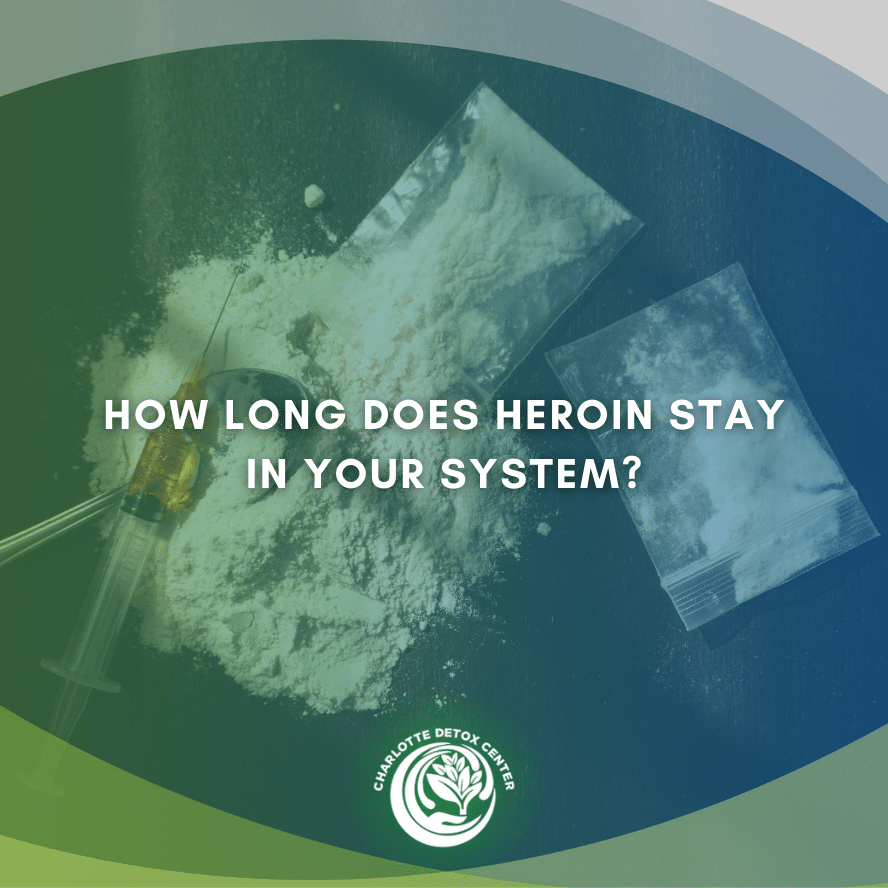How Long Does Heroin Stay in Your System?

Medically Verified: 2/1/24
Medical Reviewer
Chief Editor

All of the information on this page has been reviewed and verified by a certified addiction professional.
Heroin is an illicit opioid drug that is classified as a Schedule I Controlled Substance in the United States. This drug is scheduled so harshly because it is highly addictive, extremely detrimental to your health, and has no medicinal uses.
According to the National Institute on Drug Abuse, “Among people aged 12 or older in 2020, 0.3% (or about 902,000 people) reported using heroin in the past 12 months.”[1]
When someone abuses heroin, they either smoke, snort it or inject it directly into their veins. Because this substance is fast-acting, it causes quick effects of euphoria and relaxation that can be extremely addictive.
How long heroin stays in your system depends on several factors, including how long you’ve been using the drug, what kind of test you are taking, and the method of administration.
The Effects of Heroin and How Long it Lasts
The effects of heroin use can be broken down into two stages: an initial rush of euphoria and a longer-lasting feeling of drowsiness.
Once heroin enters your brain, it is broken down into morphine – the substance it is derived from.[2] The initial euphoric rush is caused by heroin, but it is short-lived. Once your brain turns the heroin into morphine, the initial rush will end and you will experience feelings of drowsiness and comfort that last for a few hours.
The exact rate at which heroin is broken down by your body is difficult to pinpoint because it is different for everyone. The factors that play a role in how long heroin will remain in your body include:
- Your bodyweight
- Body fat content
- Age
- Sex
- The dosage you took
- The quality and purity of the heroin
- Your liver and kidney health
Typically, heroin has a half-life of two to eight minutes. This means that the substance will be broken down to half of its contents within that time frame. Overall, it takes about four to five half-lives (between 8 to 48 minutes) for the heroin to be eliminated from your body.[3] However, the metabolites of heroin can remain detectable in your system by certain drug tests for longer amounts of time.
How Long Can Drug Tests Detect Heroin in Your System?
While heroin is eliminated from your body after less than an hour from the initial time of use, the metabolites it leaves behind stay in your system much longer. Heroin is broken down into morphine and a metabolite known as 6-acetyl morphine (6-AM). Morphine has a longer half-life of up to 7 hours, the other metabolites it leaves behind can stay in your system for several days.[2]
How long heroin can be detected in your system also depends on the type of drug test you are taking. The different types of drug tests and how long they can detect heroin in your body include:
Urine
Urine tests are the most standard form of drug tests. They are commonly used because they are the least invasive and cost less for companies or employers to buy. Urine tests can detect heroin in your system for 1 to 4 days after your last dosage of the drug.
It is important to note that if you have been using heroin heavily and for an extended period, urine tests may be able to detect the substance for longer than 4 days. This is because the metabolites have built up in your system over time, making it take longer for your body to expel them.
Blood
Blood tests are less common because they are invasive and expensive, but you could be given one in an emergency situation. These tests can only detect heroin for the last several hours after your last dose, which is another reason they are not commonly used to detect the substance in your system for job opportunities or in routine medical settings.
Saliva
While some evidence suggests that saliva tests are more accurate than urine tests, they can only detect heroin in your system within a few hours of your last dose. For this reason, saliva tests are not commonly used to detect substances like heroin in your body.
Hair
Hair follicle tests can detect heroin (and any other substance) in your system for up to 90 days. However, like urine tests, if you have been using heroin for a long time you may have a longer detection window. Hair tests are not as common as urine tests because the process of sending them to the lab for testing can be costly, but some careers may require you to take one of these tests before offering employment.
Finding Help for Heroin Addiction
Heroin is a highly addictive substance that can wreak havoc on your life, including putting you at risk of developing serious mental and physical conditions. Overcoming an addiction to heroin can be extremely difficult, however, with the help and support from a heroin rehab program you can learn how to maintain long-term sobriety.
To learn more about how an addiction detox and treatment center can help you beat heroin addiction, contact Charlotte Detox Center today.
References:
